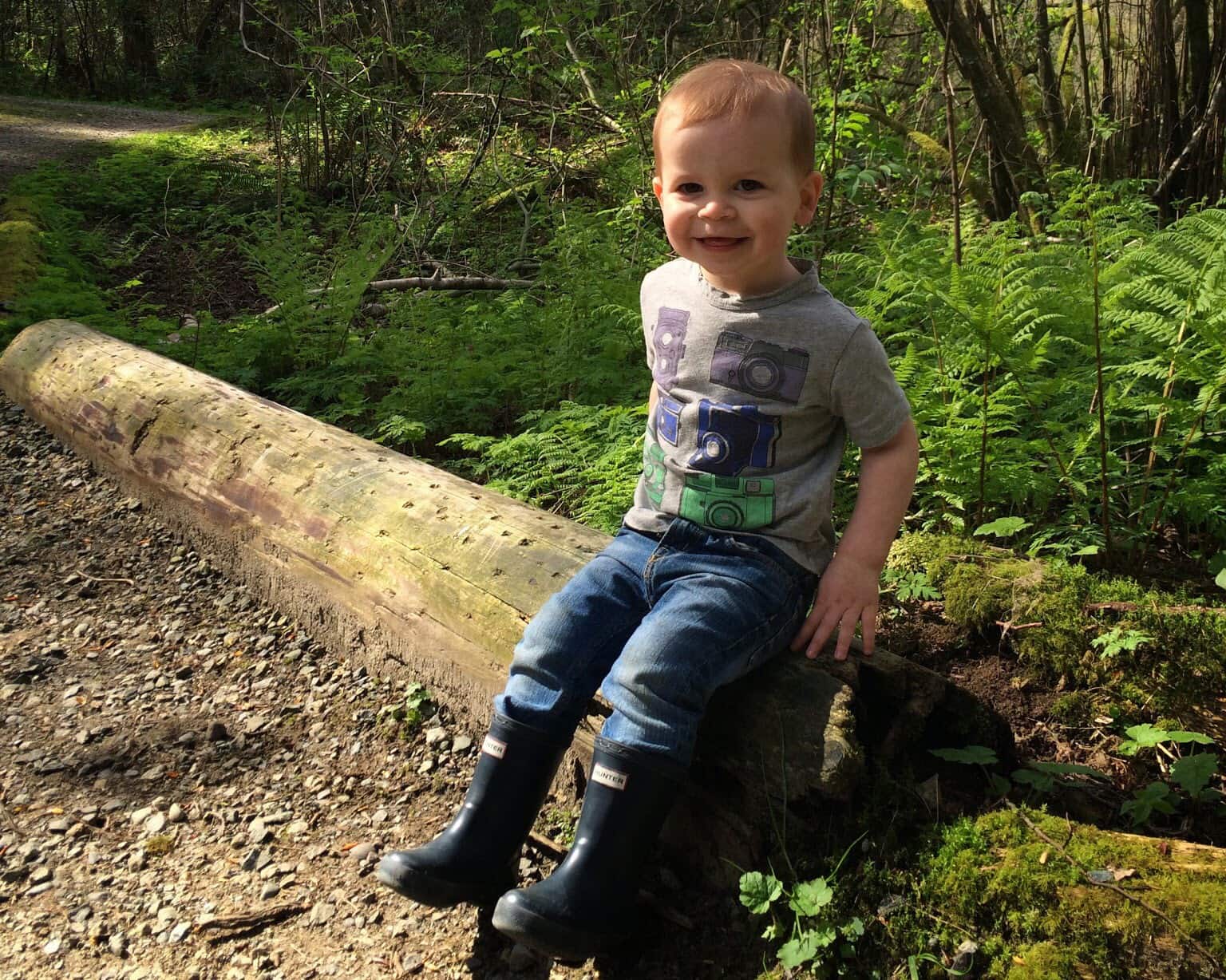Table of Contents
- Sadly, this wasn’t the only time that I struggled to find happiness as a parent
- The truth is it’s not just me. Collectively, our mental health is suffering.
- Research shows there are three big issues with focusing on future happiness:
- 1. When we are less present, we are less happy.
- 2. Humans are terrible at predicting what will make them happy.
- Many studies have highlighted these forecasting errors.
- 3. We’re insanely good at acclimatizing to what’s made us happy (or sad for that matter).
- So much of what we do works against our happiness. But research has shown there are ways to essentially hack our happiness.
- Count blessings and express gratitude.
- Counting blessings and expressing gratitude increase overall wellbeing and reduce suffering.
- Exercise regularly.
- Spend money strategically.
- Strengthen close relationships.
- 5. Set goals and work towards them.
- The TLDR on how to be a happier parent
- Related reading:
Inside: When life can be so uncertain, these strategies will help you feel better and be a happier parent.
Shortly after I had my second baby, I didn’t recognize myself.
With two babies under two, sleep was fleeting, my marriage was struggling, and my body felt like a feeding troth. Days had no definition – just piles of diapers and endless nursing. Cleaning a room in my home was like whack-a-mole. Taking on one area of our apartment seemed to mean that other rooms blew up.
So much of my life was spent running out the clock. How much time was it until naptime? Until my husband came home from work? Until bedtime?
Though this time should have been more joy-filled, my focus was on survival.
Sadly, this wasn’t the only time that I struggled to find happiness as a parent
There have been other periods of my children’s lives that have been like this. Where I simply go through the gears to get to some sort of end goal – whether it be the day, the weekend, or for the pandemic restrictions to ease and for life to get better.
Related read: It takes a village: Three anthropological reasons mothers need more support
The truth is it’s not just me. Collectively, our mental health is suffering.
Before the pandemic, research out of Canada and the U.S. showed that approximately one in five citizens was living with a mental illness. Since the pandemic, 40% of respondents indicate their mental health has worsened. But the truth is that how well we’re doing emotionally isn’t just about an absence of mental illness or negative affect. It is also about how happy we are.
Paradoxically, English-speaking countries put the greatest emphasis on happiness and yet we aren’t all that happy (Nordic countries, like Finland, Denmark and Sweden, as well as Israel and Switzerland consistently outrank the US and Canada).
One of our biggest issues is we that tend to overemphasize the pursuit of happiness. This actually undermines how happy we are.
Research shows there are three big issues with focusing on future happiness:
1. When we are less present, we are less happy.
This means that the more I focus on future happiness the less accepting I am of my current conditions. The more I do this, the less happy I will be.
So spending my life waiting for breaks, whether it was nap time or bedtime, was very much working against me.
2. Humans are terrible at predicting what will make them happy.
Numerous studies show that when thinking about how happy or devastating an event will be, people overinflate their feelings.
So though I thought my whole life will fall into place once my two young ones sleep through the night, or that I would be devastated if I couldn’t get the food colouring “painting” out of my carpet, neither of these things is entirely true.
Others may feel their happiness hinges on getting a promotion, moving to a bigger home, or finally being able to afford a tesla. While all of these life events are amazing, people get used to the most exciting life events relatively quickly.
On top of habituating to what’s new or exciting, forecasting errors tend to make us underestimate the stress that will come with more responsibility at work or packing up all of our belongings to move.
Many studies have highlighted these forecasting errors.
Research has looked at this in a variety of different contexts.
In one study, researchers found that participants forecasted that having to talk to strangers on their commute home would negatively impact both their feelings of productivity and happiness. However, after being assigned to this condition participants reported neither was true.
Similarly, incoming university students grossly overestimated how getting their desired residence would impact them. They also thought the house’s appearance or location mattered the most. However, the factor that predicted student happiness were the social relationships within the house and not physical features.
Not only are we bad at forecasting what makes us happy, but we also don’t stay happy all that long.
3. We’re insanely good at acclimatizing to what’s made us happy (or sad for that matter).
Not only do we overestimate how happy or sad an event will make us, the feelings we have about an event tend to wear off. As such, my kids sleeping through the night will feel amazing at first, but in a couple weeks’ time, it will just feel normal. Research has on lottery winners, newlyweds, and people who have made big purchases (such as finally getting a tesla) show that the exciting event slowly just becomes part of our condition and we bounce back to our previous levels of happiness.
The TLDR?
- Focusing on future happiness rather than present happiness makes us less happy
- We tend to make mistakes when forecasting what will make us happy.
- And, even if those things that will make us happy happen, we get used to them and their happiness power wears off.
This matters so much because it means we can waste our time, money and energy on things that don’t have that much power over our overall emotional wellbeing.
So much of what we do works against our happiness. But research has shown there are ways to essentially hack our happiness.
Growing research shows that certain simple, intentional activities can boost happiness both in the short and long term.
Count blessings and express gratitude.
Whether it’s getting a diagnosis for a high-needs child, facing financial instability, or figuring out how to live during a lockdown, life can be tumultuous and unrelenting.
Counting blessings is arguably the most potent way to increase happiness as it draws our attention to the present. (Hint: too much rumination on the past or focus on the future undermines contentment). It is also beneficial because it focuses on abundance. One of my all-time favourite quotes is:
Gratitude unlocks the fullness of life. It turns what we have into enough, and more. It turns denial into acceptance, chaos to order, confusion to clarity. It can turn a meal into a feast, a house into a home, a stranger into a friend. Gratitude makes sense of our past, brings peace for today and creates a vision for tomorrow.
Melody Beatie
Counting blessings and expressing gratitude increase overall wellbeing and reduce suffering.
Extensive research shows that regular gratitude practices reduce anxiety, increase happiness, and improve relationships. On top of this, a literature review shows that people who express gratefulness regularly have more hope for their future, experience less stress and, as a result, have experience better health.
Though there are benefits to gratitude exercises it is important to note that the effects can wear off. For example, some people report that after using a gratitude journal for some time, the content they write starts to get really repetitive.
However, there are ways to make gratitude practices more effective. For one, simply adding “because” to an entry increases its gratitude power. So instead of saying I’m grateful for my family each and every day, I can write that I am grateful for my daughter today because she used her allowance to buy her brother a gift. Another powerful gratitude technique is to intentionally thank loved ones and strangers more. In one study, participants feared writing a thank you letter may come off as awkward or may not be worded well. However, after receiving the unexpected letters, recipients indicated that the letters were not awkward, but warm and well written.
No matter how you choose to express gratitude, it is a wonderful way to draw attention to the positive aspects of your life and can also improve relationships, decrease stress, and improve overall health.
Exercise regularly.
We’ve long heard that exercise improves our health and the truth is its benefits on our psychological health are huge. For one, longitudinal research shows that people who adopt a new exercise program report improved mood even six months after starting. Additionally, research on anxiety and depression shows that 20 minutes of cycling reduces both state anxiety and state depression.
Finally, during the initial three months of the COVID-19 lockdown, research examined how exercise impacted mood.
They found that respondents who worked out regularly, regardless if they just started working out or had been for some time, had the best moods. In contrast, respondents who stopped exercising once the pandemic hit fared the worst.
As little as twenty minutes of exercise a few times a week can pay dividends for mental health.
Spend money strategically.
It goes without saying that financial stress sucks. But money doesn’t have the power over happiness that many people think. (Overwhelming research shows that increases in income only have a mild, and often non-lasting impacts on happiness. And, when compared to very unhappy people, very happy people do not differ significantly in their perceptions of their income.)
However, how we spend money can make us happier.
First, research shows that spending money on others, including loved ones, unsuspecting strangers, and charity is related to greater happiness. In fact, even people with limited funds and in less advantaged countries report greater happiness when spending on others.
Also spending money on experiences instead of material goods tends to make people happier. The research on this suggests this is because:
- we’re more likely to re-live experiences in our memories,
- experiences tend to become part of our identity, (I am more likely to define myself as someone who practices yoga than someone who bought a cute outfit at lululemon),
- we tend to share our experiences with others.
In short, if we want to “buy” happiness, we should find ways to create memories and be generous towards others.
Strengthen close relationships.
There is overwhelming research to suggest that people with strong social connections are the happiest. Also, and as mentioned above, people are happier when spending money and resources on others and when talking to strangers (than working on their transit home).
Recently, for a happiness intervention project I participated in, I spent five days engaging in “relationship investment” activities. So for those five days, I found an opportunity to do something special with one of my children to strengthen our relationship. The activities were simple, but had such a powerful impact on both my and my kids’ happiness. On the first day, I joined my daughter as she walked to her friend’s house. On the second day, I sat beside my son as he played Zooba on the iPad and had him explain to me how it works and what he liked about it. On the third, my daughter and I did a mindfulness exercise before bed.
Not only did I get to stop and enjoy my children more, but I also saw how much these little relationship strengthening activities meant to them.
5. Set goals and work towards them.
This, of course, could be some of the examples above – expressing more appreciation, starting a gratitude journal, engaging in random acts of kindness, or exercising more. However, it can also mean working on individual projects that matter to you too. It is widely held that people high in self-efficacy are high in happiness too. Meaning, that people who believe they are good at setting goals and getting things done feel good about themselves.
So start a vegetable garden, re-finish that dresser you never really liked, or sign up for a course, even though these happiness-boosting exercises may not be centred on parenting, they will boost your overall mood and improve how you feel in your family.
The TLDR on how to be a happier parent
People grossly over and underestimate what will make them happy. One of these ways is mistakenly working on being happy in the future rather than right now. Gratitude is one of the most potent ways to improve happiness because it draws your attention to the present and focuses on what you do have (versus what you don’t). There are a number of other ways to improve happiness including exercising more, strengthening close relationships, and working towards goals. However, none of these need to be done all at once. Equally, not every activity is a good fit for everyone. The best course of action is one that seems like a good fit for you.
Related reading:
“It Takes a Village;” 3 Anthropological Reasons Mothers Need More Support
Responsive Parenting is Crucial for Development: This Is Why
It’s Science: Dropping Negative Language Improves Child Behaviour











3 comments